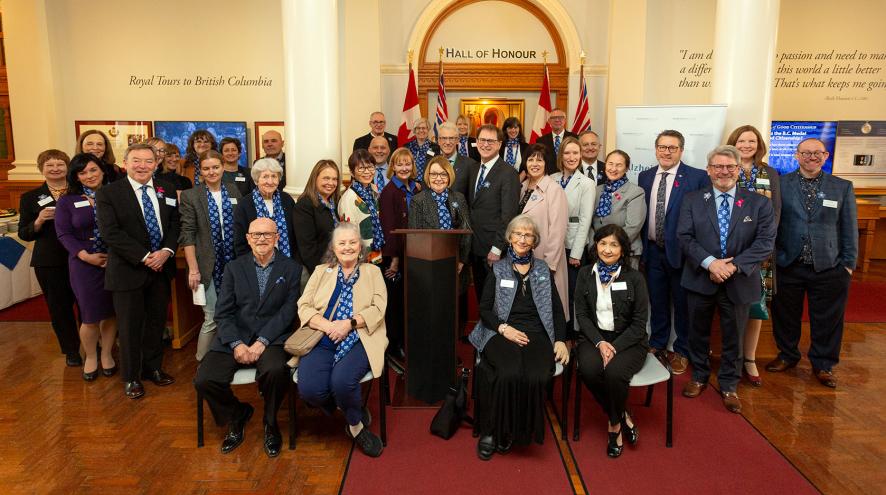2023 Dementia-Friendly Legislature Luncheon
Advocates push for a coordinated approach to dementia care at the B.C. Legislature

The voices of people with lived experience of dementia were heard throughout the halls of the B.C. Legislature at the Alzheimer Society of B.C.’s 2023 Dementia-Friendly Legislature Luncheon on March 8.
The annual luncheon is a critical opportunity to share stories, challenge stigma and explore how we can work together to support the growing number of people affected by dementia in the province. The Honourable Adrian Dix, B.C. Minister of Health, MLA Adam Olsen, B.C. Green spokesperson and MLA Shirley Bond, Official Opposition spokesperson shared both their personal connections and public commitments to supporting our work at the podium, before welcoming Society staff and advocates into question period.
B.C.’s Legislature was the first in Canada to become dementia friendly. We’re grateful for the care all MLAs in B.C. have shown to ensure our work to support people affected by dementia continues – and to all those who participated in, and moved forward, meaningful discussions that demonstrated this commitment at the luncheon.

Responding to the growing effect of dementia on our communities
Jana Schulz took the mic to push for a provincial dementia strategy. The advocate, dementia education coordinator and elected official within the Métis Nation of B.C. shared the financial impact of stepping away from a full-time position to provide care for her father and the need for more trauma-informed and culturally-safe supports for Indigenous people affected by dementia. She also highlighted the need to see more targeted research to understand the impacts of the residential school system and or intergenerational trauma on responsive behaviours for people affected by dementia.
“If we are able to have tough discussions in safe spaces, we can find cracks in the system,” Schulz says. “We can develop solutions that supports individuals living with dementia and their caregivers in accessing services and supports from pre-diagnosis to end-of-life that honours their emotional, spiritual, mental and physical well-being.”
Advocacy starts at home
Among the group of people with lived experience who met with legislators is long-time advocate Jim Mann. Jim has been sharing his experiences to help inform policy, improve research and build more inclusive communities for others living with dementia for nearly two decades.
“You don’t have to go to the legislature to advocate,” Jim says. “You can be an advocate anywhere in your community, even at the grocery store. It starts by speaking up to help educate the people around you.”
To learn more about how to advocate for yourself or someone living with dementia, visit: alzbc.org/advocacy
